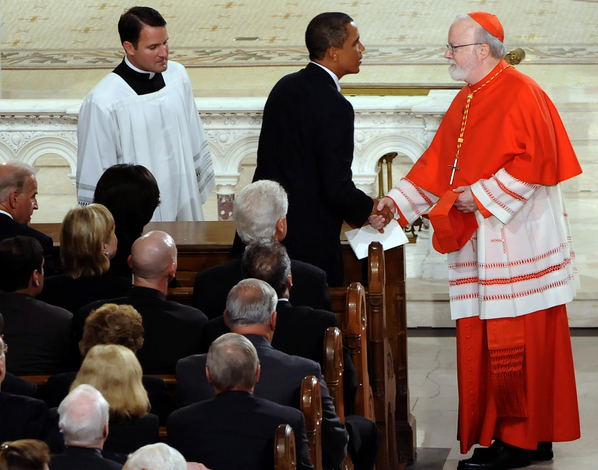Female Cardinals and the Morning-after Pill: Change Is Possible, and Is Here
By Melinda Henneberger
No, the next pope will not be a nun — yet there could well be major changes in the role of women in the church, even without any changes in current church law. It’s not widely known, but nothing precludes women from serving as cardinal-electors, even though they can’t be ordained as priests. So the next pontiff could easily appoint female cardinals — and send the message that women really do have an important leadership role in the church. No, the next pope won’t be making any big announcements, either — not on Day One or Day 1,001 — about changes in the church’s position on priestly celibacy, or heaven knows, abortion. Yet before he left St. Peter’s on Wednesday, Benedict XVI himself made clear that change is a constant, even in the Eternal City. He referred to the church as a “living body,” always in flux. In fact, important changes have happened in recent weeks, even beyond the historic news of Benedict’s retirement. Though eclipsed by the focus on the pope, German bishops cautiously voiced approval of the use of the morning-after pill to prevent conception following a rape. And finally, no, the next pope isn’t very likely to be the American most talked about as a contender, Cardinal Timothy Dolan of New York. In an interview with CNN’s Christiane Amanpour in Rome on Thursday, Dolan joked that he’s always been high on his mom’s list for the job — and in his jovial way, he demonstrated why, despite being well known and well liked by his fellow cardinals, he’s probably too much of an American to be chosen. But when the cardinals gather to choose a successor to Benedict, perhaps the most important question they face is whether their choice will even begin to move the Catholic Church past the clerical sex abuse scandal that has hung over it for so long. A more serious reason Dolan isn’t the American antidote to what ails the church also came from his own mouth, when he told Amanpour, in reference to the scandals, that the Catholic Church, though once a model of what not to do, is now a model of what to do. “Now the church is doing it right,” he said, though if we want to be critical “we could go back decades.” But that wouldn’t be necessary, your eminence. Just last year, in September, Bishop Robert Finn of Kansas City was found guilty of failing to report a priest suspected of child sex abuse — child porn was found on his computer. Finn was sentenced to two years of probation — and yet remains a bishop in good standing. As we head into a conclave in which one of the cardinal-electors, Roger Mahony of Los Angeles, is known to have protected child predators with particular energy, it’s patently false to say that abuse is an issue from decades gone by, whipped up by, as he put it, those who prefer to see us as evil personified.
What’s more, Dolan’s statement that the issue persists in part because “a lot of people…don’t want any good news” about the Catholic Church — and want to think that the institution is “the Great Satan” — certainly raises questions about how much has been learned in the decade since, at the height of the sex abuse scandals, that kind of talk was common among Vatican officials. Back then, many of those officials truly believed the issue was manufactured by the enemies of Holy Mother Church. One American cardinal who knows better, who has for years been keenly sensitive to the sexual abuse issue, is Boston’s Sean O’Malley, the other American most frequently mentioned as a possible successor to Benedict. Though his election is hardly the most likely outcome, O’Malley appears to have no enemies, speaks multiple languages, is well known to his fellow cardinals, having been a bishop for decades, and is a special favorite among the Latin American cardinals, who are lined up to support him if there’s a deadlock among Italians and the perceived front-runner, Milan’s Angelo Scola, isn’t chosen. O’Malley instituted a “zero tolerance” policy on sex abuse as early as 1995, requiring all Catholic clergymen, staff and volunteers who worked with children to participate in abuse prevention workshops, agree to criminal background checks and fill out questionnaires about their past.
O’Malley built a reputation as a reformer as a result, and it is that reputation that has media outlets in Rome buzzing about him as a possible contender. Benedict, a reluctant pontiff from the start, seemed relieved to be putting down the burdens of the papacy, saying, “I look forward to giving my obedience to my successor,” and telling the cardinals, “You have borne with me the weight of the Petrine ministry.” Given all the internal and external challenges the church faces, it’s hard to imagine many cardinals are truly pining for the post — or would wish it on a friend. Yet if O’Malley were chosen, it would send the message at long, long last that the church’s leader truly does comprehend the issue that has so compromised the moral standing of the entire institution.
|
.
Any original material on these pages is copyright © BishopAccountability.org 2004. Reproduce freely with attribution.


